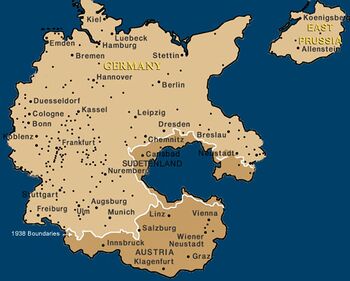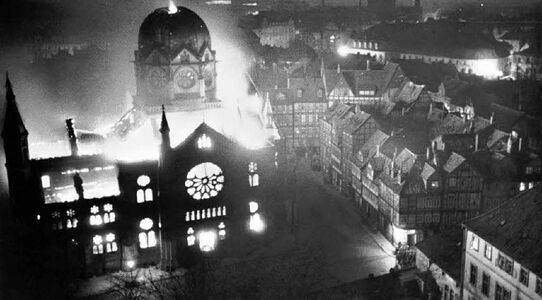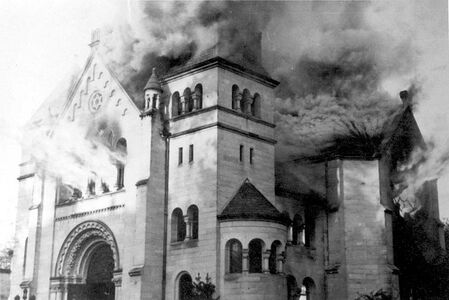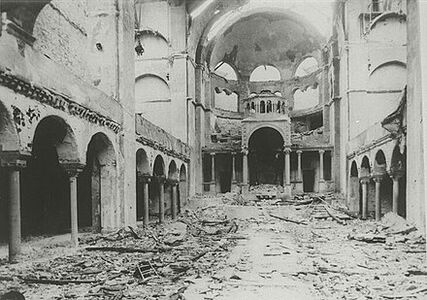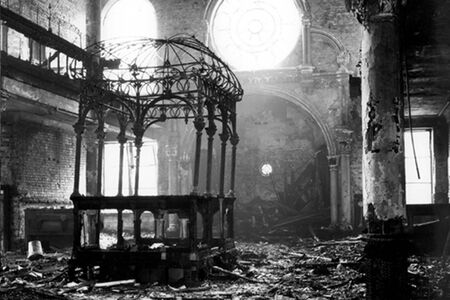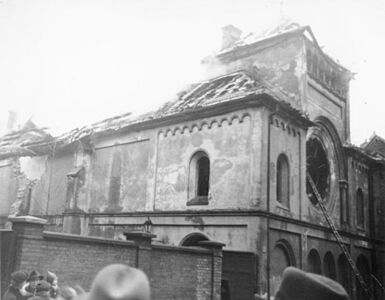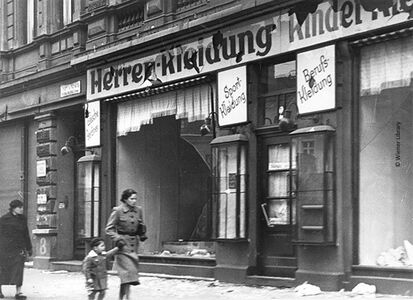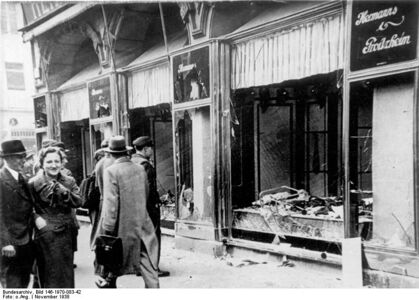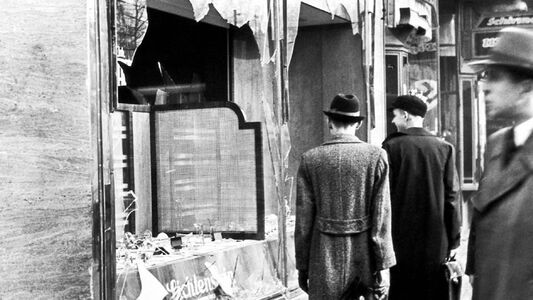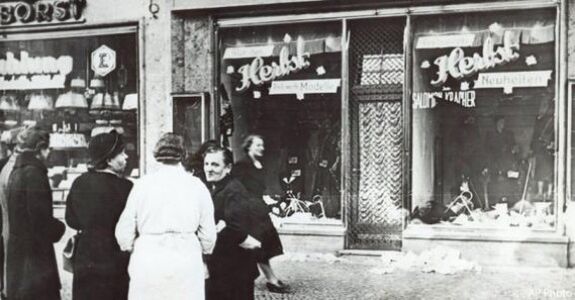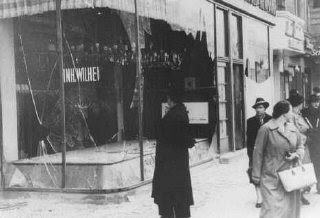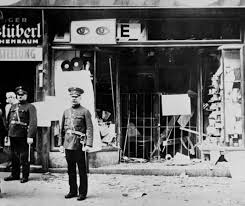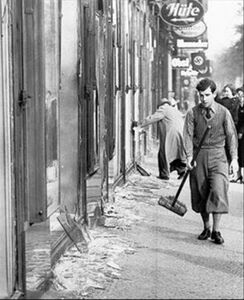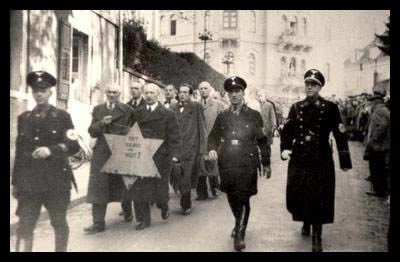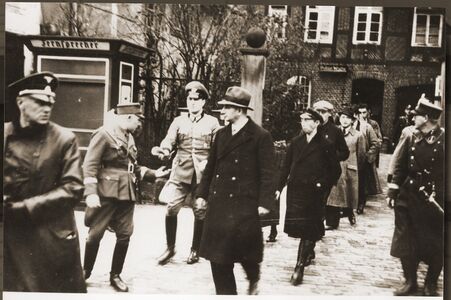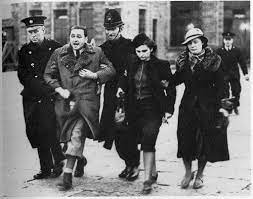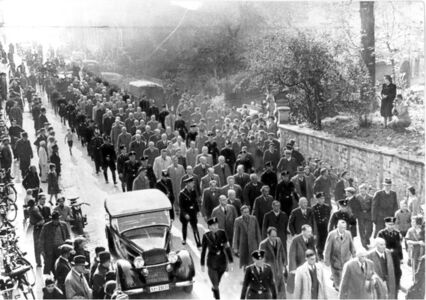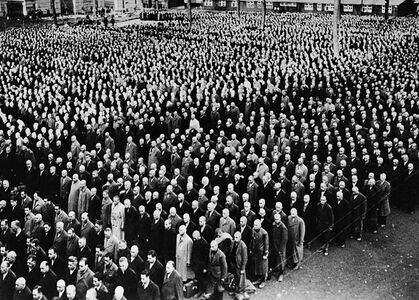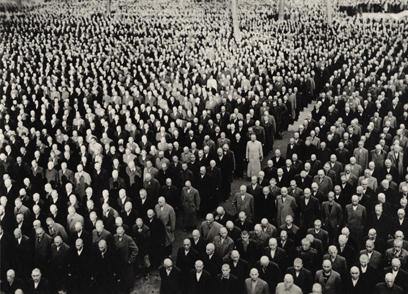Difference between revisions of "Category:Kristallnacht (subject)"
(→Arrest) |
|||
| (6 intermediate revisions by the same user not shown) | |||
| Line 1: | Line 1: | ||
[[File:Kristallnacht Map.jpg|thumb|350px]] | |||
'''Kristallnacht''' (see [[Holocaust Children Studies]]) | '''Kristallnacht''' (see [[Holocaust Children Studies]]) | ||
== Overview == | == Overview == | ||
Kristallnacht (or the Night of Broken Glass) was a pogrom against Jews carried out by SA paramilitary forces and civilians throughout Nazi Germany on 9–10 November 1938. | |||
Jewish homes, hospitals, schools and businesses were ransacked as attackers demolished buildings with sledgehammers. Rioters destroyed 267 synagogues throughout Germany, Austria and the Sudetenland. Over 7,000 Jewish businesses were damaged or destroyed. Close to 100 Jews were killed. The German authorities organized the pogrom and looked on without intervening. | |||
In the aftermath of Kristallnacht, also called the “Night of Broken Glass,” some 30,000 Jewish men were arrested and sent to Nazi concentration camps. | |||
German Jews had been subjected to repressive policies since 1933, when Nazi Party leader Adolf Hitler (1889-1945) became chancellor of Germany. However, prior to Kristallnacht, these Nazi policies had been primarily nonviolent. After Kristallnacht, conditions for German Jews grew increasingly worse. During World War II (1939-45), Hitler and the Nazis implemented their so-called “Final Solution” to the what they referred to as the “Jewish problem,” and carried out the systematic murder of some 6 million European Jews in what came to be known as the Holocaust. | |||
== Burned Synagogues == | == Burned Synagogues == | ||
| Line 32: | Line 41: | ||
== | == Mass Arrests == | ||
<gallery mode=packed align=left heights=200> | <gallery mode=packed align=left heights=200> | ||
File:Arrest Kristallnacht3.jpg | |||
File:Arrest Kristallnacht4.jpg | |||
File:Arrest Kristallnacht5.jpg | |||
File:Arrest Kristallnacht6.jpg|Baden-Baden | |||
File:Arrest Kristallnacht.jpg|Jews at Buchenwald | File:Arrest Kristallnacht.jpg|Jews at Buchenwald | ||
File:Arrest Kristallnacht2.jpg|Jews at Buchenwald | File:Arrest Kristallnacht2.jpg|Jews at Buchenwald | ||
</gallery> | </gallery> | ||
Latest revision as of 10:15, 31 March 2021
Kristallnacht (see Holocaust Children Studies)
Overview
Kristallnacht (or the Night of Broken Glass) was a pogrom against Jews carried out by SA paramilitary forces and civilians throughout Nazi Germany on 9–10 November 1938.
Jewish homes, hospitals, schools and businesses were ransacked as attackers demolished buildings with sledgehammers. Rioters destroyed 267 synagogues throughout Germany, Austria and the Sudetenland. Over 7,000 Jewish businesses were damaged or destroyed. Close to 100 Jews were killed. The German authorities organized the pogrom and looked on without intervening.
In the aftermath of Kristallnacht, also called the “Night of Broken Glass,” some 30,000 Jewish men were arrested and sent to Nazi concentration camps.
German Jews had been subjected to repressive policies since 1933, when Nazi Party leader Adolf Hitler (1889-1945) became chancellor of Germany. However, prior to Kristallnacht, these Nazi policies had been primarily nonviolent. After Kristallnacht, conditions for German Jews grew increasingly worse. During World War II (1939-45), Hitler and the Nazis implemented their so-called “Final Solution” to the what they referred to as the “Jewish problem,” and carried out the systematic murder of some 6 million European Jews in what came to be known as the Holocaust.
Burned Synagogues
Broken Glasses
Mass Arrests
Pages in category "Kristallnacht (subject)"
The following 57 pages are in this category, out of 57 total.
1
- Alfred Berg (M / Austria, 1924-2013), Holocaust survivor
- Wolfgang Blumenreich (M / Germany, 1924-2007), Holocaust survivor
- Edith Goldapper Rosenthal (F / Austria, 1924-2021), Holocaust survivor
- Egon Salmon (M / Germany, 1924), Holocaust survivor
- Heinz Stephan Lewy (M / Germany, 1925), Holocaust survivor
- Bertl Rosenfeld / Bertha Esenstad (F / Germany, 1925), Holocaust survivor
- Richard Dreyfus (M / Germany, 1926), Holocaust survivor
- Siegfried Knop (M / Germany, 1926), Holocaust survivor
- Fransi Linhard (F / Austria, 1926-1939), Holocaust survivor
- Eugene Moses / Gene Moser (M / Germany, 1926), Holocaust survivor
- Kurt Simon Rosenbaum (M / Germany, 1926), Holocaust survivor
- Gert Alexander (M / Germany, 1927), Holocaust survivor
- Friedrich Reif / Frederick Reif (M / Austria, 1927), Holocaust survivor
- Edith Rosenfeld / Edith Kaye (F / Germany, 1927-1998), Holocaust survivor
- Lieselotte Arndt / Lotte Brown (F / Germany, 1928), Holocaust survivor
- George Dreyfus (M / Germany, 1928), Holocaust survivor
- Hans Hermann Fischer / Hans Fisher (M / Germany, 1928), Holocaust survivor
- Werner Goldschmidt
- Helmut Moses / Harvey Moser (M / Germany, 1928), Holocaust survivor
- Erich Stein / Eric Stein (M / Austria, 1928), Holocaust survivor
- Ruth Fischer / Ruth Bickhardt (F / Germany, 1929), Holocaust survivor
- Hans Freeman
- Hans Fuld / Harry Fuld (M / Germany, 1929), Holocaust survivor
- Manfred Mayer / Frederick Raymes (M / Germany, 1929), Holocaust survivor
- Ingeborg Weil / Ingeborg Ohringer (F / Germany, 1929), Holocaust survivor
- Gerd Altschul / Gerry Allan (M / Germany, 1930), Holocaust survivor
- Charlotte Berg (F / Austria, 1930), Holocaust survivor
- Claus Gossels / Peter Gossels (M / Germany, 1930), Holocaust survivor
- Evelyn Klein / Evelyn Altman (F / Hungary, 1930-2002), Holocaust survivor
- Renate Reutlinger / Ronnie Breslow (F / Germany, 1930), Holocaust survivor
- John Rosen / Hans Rosenbaum (M / Germany, 1930), Holocaust survivor
- Ruth Rosenfeld / Ruth Ezekiel (F / Germany, 1930-2009), Holocaust survivor
- Jules Steinhardt (M / Germany, 1930), Holocaust survivor
- Resi Adler (F / Germany, 1931), Holocaust survivor
- Wulf Grajonca / Bill Graham (M / Germany, 1931-1991), Holocaust survivor
- Ralph Moratz (M / Germany, 1931-2016), Holocaust survivor
- Henry Foner / Heinz Lichtwitz (M / Germany, 1932), Holocaust survivor
- Heinz Mayer (M / Germany, 1932), Holocaust survivor
- Edith Milton / Edith Cohn (F / Germany, 1932), Holocaust survivor
- Ines Spanier / Ines Jacoby (F / Germany, 1932), Holocaust survivor
- Kurt Steinhardt (M / Germany, 1932), Holocaust survivor
- Rolf Altschul / Rolf Allan (M / Germany, 1933), Holocaust survivor
- Werner Gossels (M / Germany, 1933), Holocaust survivor
- Gerd-Fritz Grünstein / Gerald Granston (M / Germany, 1933), Holocaust survivor
- Rudolf Jacobsohn / Rudolf Cohen (M / Germany, 1933), Holocaust survivor
- Peter Linhard (M / Austria, 1933-2005), Holocaust survivor
- Herman Rosenfeld (M / Germany, 1933-1990), Holocaust survivor
- Edith Salmon / Edith Smith (F / Germany, 1933), Holocaust survivor
- Beatrice Bonne / Beatrice Sichel (F / Germany, 1934), Holocaust survivor
- Liane Reif / Liane Lehrer (F / Austria, 1934), Holocaust survivor
- Wolfgang Schüfftan (M / Germany, 1936), Holocaust survivor
- Esther Rosenfeld / Esther Starobin (F / Germany, 1937), Holocaust survivor
- Ruth Blumenstock / Ruth Mandel (F / Austria, 1938), Holocaust survivor
- Thomas Jacobsohn (M / Germany, 1938), Holocaust survivor
- Judith Köppel / Judith Steel (F / Germany, 1938), Holocaust survivor
- Margit Oelsner
- Hans-Jacob Bonne (M / Germany, 1939), Holocaust survivor
